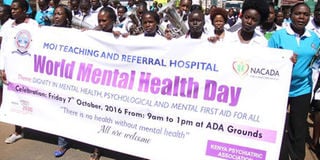Rising Africa needs sound mental health

Moi Teaching and Referral Hospital staff and members of the public march in Eldoret town to mark the World Mental Health Day on October 7, 2016. Mental health should be given a priority. PHOTO | JARED NYATAYA | NATION MEDIA GROUP
What you need to know:
- The policy proposes the setting up of a mental health board to oversee funding and ensure service provision, training of service providers, issue guidelines, and create public awareness.
A quick Google search on mental health in Africa shows images of people locked up, in chains and kept in inhumane conditions.
Mental health is a taboo topic and many are quick to dismiss it.
Unfortunately, this attitude is prevalent even among governments, which are responsible for ensuring that citizens get good health care, including mental health care.
In recent years, “Africa Rising” has been a catch phrase in many conversations about the continent.
These words are used to describe the perceived development in the continent and the opportunity for more growth.
Countries such as Kenya have taken these words to heart, hosting a variety of international meetings in recent months, all in an effort to create an atmosphere for trade and development.
According to Median Age, Africa is the youngest continent in the world with a median age of 19.7, meaning that its rise is largely in the hands of its young people.
African governments have taken this into consideration and written youth into their development plans.
The Kenyan Government, for example, has come up with initiatives such as the Youth Fund, whose strategic focus is on enterprise development and participation by the youth in nation-building, as well as hosting summits for the youth at State House to make their voices heard.
Despite these efforts, the rise of Kenya, and Africa, is leaving something out: it does not put into consideration the need to create a conducive atmosphere for the mental wellbeing of the people who are powering this rise.
The World Health Organisation teamed up with the World Bank earlier this year to convene an international gathering dubbed Out of the Shadows: Making Mental Health a Global Priority, which brought together ministers of finance and health and other high-level government officials, international development aid agencies, foundations, private sector partners, and civil society to look at mental health from an economic perspective and try to move it from the margins to the mainstream of the global health agenda.
VITAL STEP
Most governments neglect the burden that mental health places on their economies and the weight of unproductivity brought about by the fact that 25 per cent of the population experiences a mental health condition at some point in their lifetime — meaning that both the patients and their caregivers cannot contribute to the development agenda.
The Ministry of Health recently launched Kenya’s first mental health policy, which has been aligned with the Constitution, the Kenya Vision 2030, and the Kenya Health Policy and seeks to reform the mental health system.
It aims to address such matters as systemic challenges and emerging trends, mitigate the burden of mental disorders, and overhaul the Mental Health Act 1989.
The policy proposes the setting up of a mental health board to oversee funding and ensure service provision, training of service providers, issue guidelines, and create public awareness.
It is, therefore, vital that the Mental Health Bill, which outlines the board’s functions and duties, is pushed through Parliament.
The Bill has stalled because of differences between the National Assembly and the Senate.
As nations observed the World Mental Health Day, marked on October 10 — whose theme this year was Dignity in Mental Health, Psychological and Mental Health First Aid — and African governments continue to promote the Africa Rising agenda, efforts should be intensified to make it possible for people in the early stages of mental illness to get help and treatment.
In Kenya’s case, this means passing the Mental Health Bill.
The writer , a 2016 Aspen fellow, is the founder and executive director of My Mind, My Funk, a mental health information and support hub.





